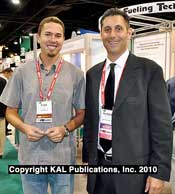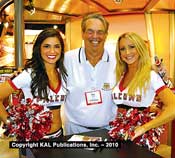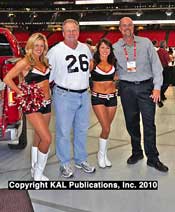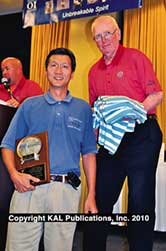
February 2011 Issue Highlights
For more complete coverage, send us an e-mail to
request a back
issue.

For more complete coverage, send us an e-mail to
request a back
issue.


National Association of Convenience Stores/Petroleum Equipment Institute Conventions and Trade Show

OPW Customer Appreciation Party

Southern California Petroleum Industry Golf and Tennis Tournament
Want to see the photos that didn't make the issue? Check out the Cutting Room Floor.
Oregon Fuel Taxes Increased
TA To Add DEF Dispensers
EPA Extends Approved E15 Blends to 2001
Vehicles
Phoenix Voters Will Weigh In On New QuikTrip
Station
Aloha Petroleum Signs $45 Million Supply
Deal
Number of Convenience Stores Grows In the
U.S.
PORTLAND, OR. — Effective as of January 1, Oregon's state gasoline and diesel taxes increased 6 cents a gallon.
The increase was mandated by Oregon House Bill 2001, also known as the Oregon Jobs and Transportation Act, passed in 2009. Under the terms of the legislation, the tax hike was supposed to kick in after two consecutive quarters of job growth in the state or January 1, 2011, whichever occurred first. The bill, which passed "easily," had been supported by the Oregon Petroleum Association because it preempted local gasoline tax increases.
It was the first gasoline tax hike enacted in Oregon since 1993.
The state gasoline tax rose to 30 cents per gallon, which will "translate to about $35 more per year for the average Oregon driver," according to Marie Dodds, director of Government and Public Affairs for AAA Oregon/Idaho. It is expected to raise $300 million a year for state transportation projects.
WESTLAKE, OH. — TravelCenters of America has announced that they will add on-island diesel exhaust fluid dispensers to 50 locations across the United States this year.
The first locations to add DEF will be the Petro Shopping Centers in Spokane, WA., Kingman, AZ., and El Paso, TX., as well as the TravelCenters of America in Lodi, OH., and Nashville, TN.
The company said the truckstops will use new dispenser and POS systems; the current method used to dispense DEF is by 2.5 gallon containers which are purchased at the fuel desk.
"We are excited to have worked so hard and so closely with key industry players to develop and bring our customers the best solution for the DEF needs," said Thomas M. O'Brien, president of TravelCenters of America. "The technology we will employ integrates the DEF dispenser with our point of sale and other systems so that drivers can purchase fuel and diesel exhaust fluid in a single transaction, and TA is the first travel center chain to bring this capability to market."
WASHINGTON, DC. — The U.S. Environmental Protection Agency has declared that E15 gasoline blends are safe for use in all cars and light duty trucks built in 2001 and later. The EPA has not approved the use of E15 for any model year for motorcycles, heavy-duty trucks, buses, boats, snowmobiles, and engines for gasoline-powered equipment such as lawnmowers and chain saws.
The January announcement expands the EPA's decision announced in October 2010 that E15 would be approved for use in vehicles manufactured in model year 2007 and newer.
The EPA did not expand the use of E15 to cars and light trucks older than the 2001 model year because of concern that ethanol's corrosive qualities could harm the engine and other metal, plastic, and rubber components.
With the expansion of the vehicles that could potentially use E15 blends, 62% of all vehicles on the road are safe to use the ethanol blends, according to the EPA and auto industry data. If E15 were used in all vehicles covered by this decision, the blend wall for ethanol use would be approximately 17.5 billion gallons annually.
Not surprisingly, the ethanol industry praised the EPA's action. "EPA continues to move in the right direction," said Renewable Fuels Association President Bob Dinneen, "but challenges still remain. The RFA continues to urge EPA to extend the waiver for E15 use to all cars and pickups."
He added that "The RFA will continue to work with EPA and other regulatory bodies to expand ethanol use beyond even 15%."
Gasoline station owners and operators are continuing to voice their concerns about labeling issues and the potential for misfueling by customers.
"E15 will find its way into older vehicles, small engines, and boats with dire consequences for personal safety, irreversible engine damage, consumer confusion, operational problems, loss of manufacturers' reputations, and warranty arguments," said Gregory Scott, executive vice president and general counsel of the National Petrochemical & Refiners Association.
"The risks are large and daunting."
Scott said that "it is inevitable that if E15 is made available at retail, many consumers will misfuel, putting the wrong gasoline into the wrong engine. This misfueling may occur intentionally, due to price differential or a quality perception, or unintentionally, due to consumer confusion or inattention. Such misfueling cannot be avoided merely with a dispenser label."
While the EPA has declared that E15 blends are safe, the automakers have not stepped forward to extend their warranties to the use of E15 and, in fact, most owners manuals list the use of blends above 10% as grounds for voiding the warranty in traditional vehicles.
The RFA's Dinneen conceded that the EPA's decision "doesn't address the issues that still remain regarding a segmented marketplace and the introduction of a new fuel."
PHOENIX, AZ. — Voters here will decide if QuikTrip will be allowed to open a new service station here.
Local residents and businesses had collected signatures protesting a new QuikTrip convenience store and gasoline station that was planned to be built at 44th Street and Palm Lane here. The Phoenix City Council reviewed the case but declined to repeal the zoning for the c-store.
Opponents of the station say they are worried about traffic from the planned QuikTrip posing safety risks to students walking to school and causing congestion in the area.
A QuikTrip representative told local reporters, however, that the neighborhood protest is being engineered by a gasoline station already operating in the neighborhood which does not want competition from QuikTrip.
Because of the number of signatures collected protesting the action of the City Council, the issue will automatically go to the voters on the Aug. 30 citywide election to determine if the station will be allowed to be built.
HONOLULU, HI. — Aloha Petroleum has won a $45 million, one-year contract to supply gasoline and diesel to select military bases on Oahu, effective as of January 2011.
Under the contract with the Army & Air Force Exchange Service, Aloha Petroleum will supply six Exchange locations on the island. The Exchange provides merchandise and services to active duty, guard and reserve members, military retirees and their families.
"Aloha Petroleum has been working with the military for several years, supplying gas, diesel, and alternative fuels for fleet, tactical and transport vehicles. We're looking forward to this new opportunity to provide fuel to military members and their families," stated Richard Parry, Aloha Petroleum president and CEO.
ALEXANDRIA, VA. — The number of convenience stores in the United States grew 1.2 percent over the past year and stands at 146,341 as of December 31, 2010.
According to the NACS/Nielsen TDLinx 2011 Convenience Industry Store Count, this is the highest number of c-stores ever recorded in the country. The previous high number had been recorded in 2008:146,294 stores.
"The increase in store count shows that the interruption of service in many areas, caused by many traditional fuel-based operators exiting the industry, is turning around. Those locations are now in the hands of capable retailers who see the consumer demand and are willing to fill it," said NACS vice chairman of Research Fran Duskiewicz, senior executive VP of Nice N Easy Grocery Shoppes Inc.
"Despite some industry pressures, the convenience store count has grown dramatically since 2001," said Todd Hale of Nielsen. "That said, the convenience store industry is widely fragmented, and we expect to see more consolidation as big-box retailers and some supermarket chains continue to add gas pumps to their sites."
With the U.S. Census Bureau data showing the U.S. population at 308.7 million, there is one convenience per approximately every 2,100 residents.
Texas once again led in terms of overall stores, with 14,466 stores, nearly one-tenth of all U.S. convenience stores. California was ranked number two in store count at 10,581, followed by Florida at 9,348.
Despite extreme price and profit volatility for motor fuels, convenience store retailers consider motor fuels operations to be important. A total of 117,297 convenience stores sell motor fuels, a 1.7 percent increase over last year. Overall, 80.2 percent of all convenience stores sell motor fuels.
The convenience retailing industry continues to be dominated by single-store operators, accounting for 62.7 percent of stores. The growth of one-store operations mirrored the overall growth in store count. The industry increased by 1,800 stores overall, the number of one-store operations increased by 1,766.
Originally published in the February 2011 issue of O&A
Marketing News.
Copyright 2011 by KAL Publications Inc.
Serving the 13 Western States, the World's Largest Gasoline, Oil, Fuel, TBA and Automotive Service Market